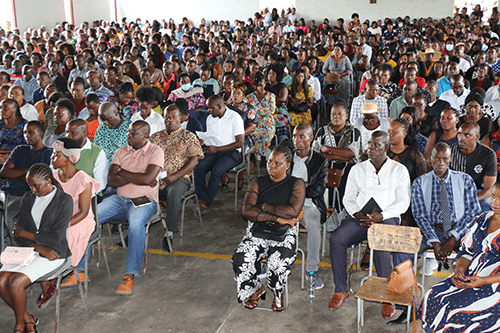KATIMA MULILO – The Zambezi education directorate continues to host consultative meetings to improve academic results, but some principals and teachers are now threatening to not attend such engagements again, claiming they bear no fruit.
This reaction by educators follows several stakeholders’ engagements that have been held on the status of Zambezi education, aimed at sharing improvement ideas during the academic year 2023.
Zambezi, which was once upon a time a shining star in terms of academic excellence, has faced an acute decline in terms of academic performance at NSSCO and AS levels in the past few years.
In an attempt to avert the dire situation, the Zambezi education directorate, with the various stakeholders, held mass meetings with staff and community members in the presence of high political delegates, including deputy prime minister Netumbo Nandi-Ndaitwah in February this year.
The latest heated edition of a consultative meeting was held last week with education deputy minister Faustina Caley, where some teachers and educators expressed their frustration with their working conditions and the dire need for teaching and learning materials.
One such principal who expressed displeasure over the continuous consultative meetings is Gibson Nkando of the Ngweze senior secondary school.
“We appreciated the presence of the honourable minister for coming to share challenges with us. Personally, next year, if there will be another minister to come and address us, I will not attend that meeting. We talked about challenges year in and year out, but there is no solution. It’s like the honourable ministers are just here to collect S&T; we don’t see results. Schools are managed without principals. You advertise a position but for three years there is no appointment. Honourable minister, can you please address this issue? We need your help and support,” Nkando argued.
Linyanti combined school principal Chrisco Siyoto feels not all stakeholders are engaged during consultative meetings which makes such gatherings meaningless.
“We are leaving other stakeholders behind. We can sit here the whole day talking about ourselves and how we can improve results. If you leave our learners and parents behind, then we are not going anywhere. They need to be motivated. If you go into the community, parents don’t understand how they can be of assistance to education. We need to educate them on the importance of education. I propose next time we incorporate our parents because we don’t know what they are teaching the children and where these kids are coming from. Kids need guidance so let’s take the blame where it is due and move ahead,” he reacted.
Some educators feel it is high time business people start ploughing back to support schools in the region.
Also, some teachers in the region expressed that teachers countrywide were not trained to properly execute the new curriculum, especially for the AS level (advanced subsidiary).
Although the region has in the past performed well in former junior secondary certificate and higher levels, the 2022 pass rate for grade 1 to 12 is below 70%.
For grades 4, 5, 6 and 12, learners scored less than 50%, while the grade 3 pass rate surpasses the regional target of 65%.
Equally, about 2.1% improvement from 12.2% to 14.3% in the NSSCO examinations was recorded, whereas NSSCAS results dropped by 3% from 37% to 34%.
Zambezi education inspector Rosco Lukubwe admitted after the analysis of the 2022 results from grades 1 to 12, the regional management engaged in face-to-face performance dialogue with all 19 secondary school teachers, school management and school boards.
He said some of the interventions taken include schools having afternoon classes to cover the syllabi early and parental involvement.
Further, he suggests heads of departments continuously monitor syllabus completion and advise accordingly while inspectors ensure that teaching and learning are monitored accordingly, among other interventions.
Meanwhile, Katima Mulilo Urban councillor Kennedy Simasiku took a swipe at educators.
“By now, we should be asking ourselves what have we done so far to ensure we have good grades at the end of the year. Are we certain the results for December will be better than the ones for last year? Are we in the position to boldly say, ‘We are going to do it?’ These are the critical questions we should be asking ourselves,” he stated.
According to Simasiku, educators should be at a stage of monitoring what has been implemented from the beginning of the year.
“But if we are still talking about plans now…dear Lord. I beg you, if we haven’t started, tomorrow is the day to start. Start small like class-to-class inspectorate.”
He pondered on the importance of strategic planning, which helps schools to plan properly how to resolve the results.
Simasiku touched on the issue of monitoring, evaluation and implementation, saying: “We have a lot of beautiful plans in Namibia but the biggest question is are we good at implementing those programmes? But when you go to schools, does the principal have a monthly plan that is cascaded to the teachers? Who is supervising that work? That’s where it starts with planning”.
He also touched on the issue of late recruitment of teachers for certain subjects in schools.
“Last year, I visited one school, which had no science and math teacher for the whole year. The principal told me, ‘Ask education’. We are failing ourselves, colleagues. I know the system has changed but there was a time an inspector went to a school and was told we have no teacher for history. Some of these inspectors will just go to HR and take the paperwork and bring a teacher and say, ‘Here is your teacher’. The process is cumbersome that you have to wait for three months and some three years, I am told,” Simasiku noted.
– anakale@nepc.com.na



